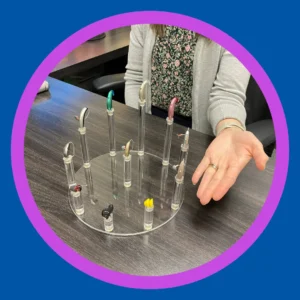Questions to Ask During a Hearing Consultation & Fitting
Taking charge of your hearing health is a major step. Whether you’re experiencing subtle changes or have long suspected hearing loss, your consultation appointment is your opportunity to get answers. The decisions you make during this visit can shape your hearing experience for years to come.
This guide explores essential questions to ask during a hearing consultation. It follows a clear, step-by-step format so you can arrive informed and leave empowered. Your hearing care provider wants to support you—so ask away!
Before You Go: Preparing for Your Hearing Consultation
The most successful consultations begin before you even arrive at the office. By preparing a list of thoughtful questions, you’ll take control of your care and avoid surprises.
Here are a few prep questions to consider before your appointment:
- Should I bring a friend or family member to help take notes?
- Do I need to bring my insurance card or medical history?
- Will I be discussing test results during this visit, or just treatment options?
Also, jot down notes about your hearing experience. What situations are most difficult for you? When do you struggle to hear? This will help your provider tailor solutions.

Understanding Your Hearing Test Results
If you’ve had a hearing test before your consultation, your provider will review the results with you. These results hold key insights.
What do my audiogram results mean?
Ask your hearing care provider to explain your audiogram in detail. An audiogram is a graph showing your ability to hear sounds across different pitches and volumes. It reveals:
- Your hearing thresholds (the quietest sounds you can detect)
- The frequencies (pitches) where your hearing is weakest
- Whether your hearing loss affects one or both ears
Your provider may explain symbols such as X (left ear) and O (right ear), and whether there is an “air-bone gap” indicating a specific type of hearing loss.
To better understand how audiograms work and what your results mean, check out this helpful resource on hearing loss and audiogram interpretation.
What type of hearing loss do I have?
Your hearing loss will typically fall into one of three categories:
- Sensorineural: Caused by inner ear or nerve damage; usually permanent
- Conductive: Caused by blockages or middle ear issues; sometimes treatable
- Mixed: A combination of both
Knowing the type helps your provider design an appropriate treatment plan.
How severe is my hearing loss?
Hearing loss is often classified as:
- Mild
- Moderate
- Severe
- Profound
Ask your provider to explain how your level affects speech understanding, background noise, and your daily life.
Do I have hearing loss in one or both ears?
Some people experience hearing loss in both ears, but not equally. Bilateral loss often requires two hearing aids for optimal hearing. Even if one ear is worse, treating both ears can improve balance and sound localization.
What caused my hearing loss?
Ask about potential causes such as:
- Age-related changes
- Exposure to loud noise
- Earwax buildup
- Infections or medical conditions
- Medications (ototoxicity)
Understanding the cause may influence prevention and future care.
Understand how hearing loss affects you at work.
Exploring Treatment Options
Once you understand your hearing profile, your provider will suggest next steps. Most often, that means hearing aids. But there are options and decisions to make.

Am I a good candidate for hearing aids?
Your provider will recommend treatment based on your audiogram, lifestyle, and goals. Many people with mild to severe hearing loss benefit from hearing aids. If your loss is profound or linked to other conditions, additional treatments may be discussed.
What type of hearing aids are best for me?
Hearing aids vary by:
- Style: Behind-the-ear (BTE), Receiver-in-canal (RIC), In-the-ear (ITE), Completely-in-canal (CIC), Invisible-in-canal (IIC)
- Technology: Bluetooth, rechargeable batteries, tinnitus masking, directional microphones
- Customization: Automatic adjustments, phone apps, environmental learning
Ask which styles are recommended for your hearing loss and lifestyle. Let them know if discretion, dexterity, or connectivity features are important to you.
Can I try hearing aids before purchasing?
Many providers offer a trial period. Ask:
- How long is the trial?
- Can I switch models if needed?
- Is there a restocking fee or full refund option?
Trial periods help you adjust and find what works best.
Learning How to Use Your Hearing Aids
It’s important to ask practical questions about how hearing aids work and how to care for them. That knowledge helps you get the best performance and value.
How do I operate my hearing aids?
Ask for a full demonstration:
- How to put them in and take them out
- How to adjust volume or change programs
- How to connect them to your phone or TV
Write things down or bring a support person to help you remember.
How do I care for and maintain my hearing aids?
Ask about:
- Daily cleaning
- Safe storage
- Avoiding moisture or high heat
- Using a drying kit
- When and how to change wax guards
Proper care extends device lifespan and prevents problems.
Discover the top hearing aids for sale.
How long do hearing aids typically last?
Most last 3 to 7 years, depending on how well they’re maintained. Ask what signs to watch for that may signal your devices need replacing.
What should I do if they stop working?
Ask:
- How to troubleshoot common issues
- Whether repairs are in-office or sent to the manufacturer
- If loaner aids are available while yours are being fixed
Knowing how to handle problems prevents frustration.
Is there a warranty?
Warranties vary by model and provider. Ask:
- What’s covered (damage, loss, repairs)
- How long the warranty lasts
- If an extended warranty is available
Always request warranty details in writing.
Learn about how real ear measurement helps your hearing aids fit better.
Budgeting and Insurance: Questions You Shouldn’t Skip
Cost plays a big role in choosing hearing aids. Knowing the financial details in advance helps you plan without surprises.
What is the total cost of the hearing aids?
Ask for an itemized estimate. Make sure it includes:
- The devices
- Initial fitting and follow-up adjustments
- Cleaning tools
- Warranty
- Accessories
- App support or training
Ask whether prices vary by brand or feature.
What ongoing costs should I expect?
Hearing aids may require:
- Batteries or charging stations
- Cleaning kits
- Future repairs
- Replacement domes or wax filters
Your provider should explain typical annual costs.
Does my insurance cover any of this?
Coverage varies widely. Ask:
- Is the hearing test covered?
- Are hearing aids or fittings reimbursed?
- Are follow-up appointments included?
- Do I need a referral from my primary doctor?
If your insurance doesn’t help much, ask about payment plans or financing options.
Long-Term Follow-Up and Support
Hearing aid success depends on consistent care and ongoing support. Make sure to ask what comes after your first fitting.
How often will I need follow-up appointments?
Your first adjustment is usually 1 to 2 weeks after fitting. After that, you may return every few months or once a year. Ask what’s recommended for your case.
What happens during follow-ups?
Follow-up visits may include:
- Rechecking hearing levels
- Adjusting device settings
- Deep cleaning
- Checking ear health
- Answering your new questions
Ask if telehealth options are available.
Can I contact you if I have questions later?
Ask about communication methods between appointments:
- Can I call, email, or text?
- Is remote adjustment available through an app?
- Do you offer emergency appointments or drop-ins?
A responsive provider makes a big difference.
Everyday Life with Hearing Aids
Your hearing care provider can also help you adjust to life with hearing aids.
How will hearing aids affect daily communication?
Ask how your new devices will perform in:
- Group conversations
- Noisy restaurants
- Phone calls
- Watching TV
- Outdoor environments
Your provider can help you learn strategies for each.
Are there ways to protect my hearing from more damage?
Yes. Ask about:
- Wearing earplugs in loud settings
- Avoiding prolonged headphone use
- Taking breaks from noise
- Scheduling yearly hearing checks
Hearing protection helps prevent further decline.
Understand how fireworks may cause hearing damage.
Will I need to change my routine?
Some changes may include:
- Charging your aids nightly
- Cleaning them daily
- Wearing them consistently for brain adaptation
- Being mindful in noisy settings
Your provider will help you ease into these changes.
Support, Education, and Community Resources
You don’t have to go through this alone. Many resources are available to support you.
Are there support groups or online forums?
Ask about:
- Local hearing loss groups
- National organizations
- Online communities
- Counseling options
Connecting with others can make your journey easier.
Can you help explain my results to my family?
Your provider may offer printed summaries, visuals, or even invite your loved one to your next visit. Shared understanding improves your support system.

Final Checklist: Questions Worth Bringing to Every Hearing Consultation
Before we wrap up, here’s a checklist you can bring to your next visit:
- What kind of hearing loss do I have?
- How severe is it?
- Can you explain my audiogram?
- What treatment options are available?
- What style of hearing aid fits my needs and lifestyle?
- Can I try them before committing?
- What are the full and ongoing costs?
- Does insurance cover any of this?
- How do I care for and operate my hearing aids?
- What does the warranty include?
- How often will I need follow-ups?
- How can I protect my hearing long-term?
- What support and resources are available?
Take Control of Your Hearing Health Today
Asking thoughtful questions during a hearing consultation helps you feel confident and supported every step of the way. The team at Stanford Hearing is here to listen, guide, and help you hear your best—for life.
Ready to book your consultation? Contact Stanford Hearing today. We’re here to answer your questions and help you take the next step.
